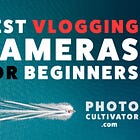Your First Camera for Filmmaking: A Beginner's Guide
Embarking on your filmmaking journey is an exciting and creative endeavor.
However, as a beginner, selecting the right camera can be challenging.
Here are two popular options and some others that might suit your needs:
Lumix GH5 vs. Fujifilm X-T4: A Closer Look
Lumix GH5
Known for its exceptional video capabilities, the Lumix GH5 is a favorite among filmmakers.
With features like 4K video recording and in-body stabilization, this camera offers versatility and high-quality footage.
Fujifilm X-T4
On the other hand, the Fujifilm X-T4 boasts impressive video quality, a flip-out screen, and renowned color science.
These features make it a compelling choice for filmmakers looking for excellent image output.
Exploring Other Options
If you're considering alternatives within a similar price range, two other cameras worth exploring are:
Canon EOS R100
The EOS R100 is an entry-level camera that belongs to Canon's RF-mount system.
It offers good video capabilities.
Additionally, for filming subjects within 100 meters, you may want to complement your setup with a lens like the Fujifilm XF 23mm F2 R WR. This lens delivers a 35mm full-frame equivalent field of view and is recognized for its compact size and weather-resistant design.
Sony A6600
Praised for its autofocus performance and extended battery life, the Sony A6600 is a reliable option for filmmakers who value these features.
Canon EOS M50 Mark II
Offering good video quality, a compact design, and a vari-angle touchscreen, the Canon EOS M50 Mark II is a versatile choice for beginners venturing into filmmaking.
Canon EOS R6 Mark II
Offering advanced features for both photography and videography, the Canon EOS R6 Mark II provides versatility for creators looking to excel in both realms.
Sony ZV-1
Ideal for vlogging and beginner videographers, the Sony ZV-1 packs a punch with its compact design and user-friendly features.
Fujifilm X-T30 II
A versatile option with advanced video capabilities, the Fujifilm X-T30 II is suitable for filmmakers looking for quality performance in a compact package.
Panasonic Lumix G100
Known for its portability and user-friendly design, the Panasonic Lumix G100 is a great choice for content creators on the go.
Blackmagic Pocket Cinema Camera 4K
Offering professional-grade features in a compact body, the Blackmagic Pocket Cinema Camera 4K is favored by filmmakers seeking cinematic quality.
These brands offer a variety of options that cater to the needs of beginner filmmakers, providing a balance between quality, affordability, and user-friendly features to support your creative journey in filmmaking.
Factors To Consider When Choosing A Camera For Filmmaking
Image quality: The aesthetic quality of the camera's output is key. Look for a camera with a "cinematic" or "filmic" feel that matches your vision.
Resolution: Determine the resolution you need based on your intended audience and delivery platform. For example, 1080P may suffice for YouTube, while higher resolutions like 4K might be necessary for future-proofing your work.
Dynamic range: A wider dynamic range allows for more flexibility in grading and capturing a broader range of tones.
Maximum ISO: A higher native ISO can save on lighting costs, but ensure the camera maintains image quality at higher ISO settings.
Lens mount: Choose a camera with a lens mount that matches your existing lenses or allows for the lenses you intend to use.
Form factor: Consider the camera's ergonomics and how it will fit into your shooting style, including handheld shooting and rigging onto dollies, sliders, or gimbals.
Required accessories: Budget for essential accessories like lenses, batteries, a battery charger, cards, a card reader, and stabilizing systems.
Codec: The file type and codec the camera shoots can affect workflow and storage requirements.
Framerate: Consider the camera's ability to shoot in slow motion or timelapse, as well as the trade-offs in resolution or image quality with higher frame rates.
Sensor size: A larger sensor can affect depth of field and low-light performance.
Low-light capabilities: Ensure the camera performs well in low-light situations, especially if you plan to shoot in various lighting conditions.
Lens options: Consider the availability and cost of lenses that match your shooting style and budget.
Image stabilization: If you plan to shoot handheld, image stabilization can be a valuable feature.
Price: Balance the camera's cost with its features and your budget.
Autofocus: While not essential for professional filmmaking, autofocus can be a useful feature for certain shooting styles.
Size/form factor: The camera's physical size and form factor can impact portability and versatility in different shooting environments.
Workflow: Consider how the camera's workflow integrates with your editing software and post-production process.
Glass: The lenses you plan to use should be a primary consideration when choosing a camera, as they will have a more significant impact on the look of your picture than the camera itself.
Speed: The camera's speed and responsiveness can be key for capturing fast-paced action or quick reactions.
Global shutter: A global shutter can be beneficial for capturing fast-moving objects without distortion.
Making Your Decision
When choosing your first camera for filmmaking, consider factors such as video quality, ease of use, lens availability, and additional features that align with your filmmaking style.
Each camera mentioned has its strengths, so prioritize what matters most to you in your creative journey.
I hope that helps,
Happy filming!
-Hakan.
Sources:
B&H eXplora - Cinema Cameras: What Filmmakers Need to Know
RTINGS - The 6 Best Cameras For Videography And Filmmaking - Winter 2024
TechRadar - The best video camera 2024: top choices for filmmakers




